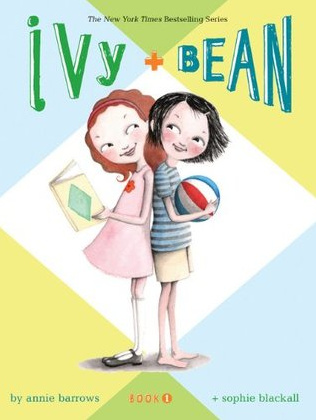

“Nancy thought Bean was a pain and a pest. Bean thought Nancy was a booger-head.”
― Annie Barrows, quote from Ivy and Bean
“THE GHOST OF PANCAKE COURT Bean”
― Annie Barrows, quote from Ivy and Bean
“I don’t think they’re really mad,” said Ivy. “You don’t?” They had seemed pretty mad to Bean. “They have to act mad so they’ll seem fair to your sister,”
― Annie Barrows, quote from Ivy and Bean
“The morning of June 27th was clear and sunny, with the fresh warmth of a full-summer day; the flowers were blossoming profusely and the grass was richly green. The people of the village began to gather in the square, between the post office and the bank, around ten o'clock; in some towns there were so many people that the lottery took two days and had to be started on June 2th. but in this village, where there were only about three hundred people, the whole lottery took less than two hours, so it could begin at ten o'clock in the morning and still be through in time to allow the villagers to get home for noon dinner.”
― Shirley Jackson, quote from The Lottery and Other Stories
“He gestured toward her twisted leg. "Like you. Some don't walk good. Some be broken in other ways. Not all. But lots. Do you think it maken them quiet and nice, to be broken?”
― Lois Lowry, quote from Gathering Blue
“Hay aire y sol, hay nubes. Allá arriba un cielo azul y detrás de él tal vez haya canciones; tal vez mejores voces...Hay esperanza, en suma. Hay esperanza para nosotros, contra nuestro pesar.”
― Juan Rulfo, quote from Pedro Páramo
“Snow kissed me last night until my mouth was sore. He kissed me so much, I was worried I’d Turn him with all my saliva. He held himself up on all fours above me and made me reach up for his mouth—and I did. I would again. I’d cross every line for him.
I’m in love with him.
And he likes this better than fighting.”
― Rainbow Rowell, quote from Carry On
“And in the depths of the city, beyond an old zone of ruined buildings that looked like broken hearts, there lived a happy young fellow by the name of Haroun, the only child of the storyteller Rashid Khalifa, whose cheerfulness was famous throughout that unhappy metropolis, and whose never-ending stream of tall, short and winding tales had earned him not one but two nicknames. To his admirers he was Rashid the Ocean of Notions, as stuffed with cheery stories as the sea was full of glumfish; but to his jealous rivals he was the Shah of Blah. To his wife, Soraya, Rashid was for many years as loving a husband as anyone could wish for, and during these years Haroun grew up in a home in which, instead of misery and frowns, he had his father’s ready laughter and his mother’s sweet voice raised in song. Then something went wrong. (Maybe the sadness of the city finally crept in through their windows.) The day Soraya stopped singing, in the middle of a line, as if someone had thrown a switch, Haroun guessed there was trouble brewing. But he never suspected how much.”
― Salman Rushdie, quote from Haroun and the Sea of Stories
BookQuoters is a community of passionate readers who enjoy sharing the most meaningful, memorable and interesting quotes from great books. As the world communicates more and more via texts, memes and sound bytes, short but profound quotes from books have become more relevant and important. For some of us a quote becomes a mantra, a goal or a philosophy by which we live. For all of us, quotes are a great way to remember a book and to carry with us the author’s best ideas.
We thoughtfully gather quotes from our favorite books, both classic and current, and choose the ones that are most thought-provoking. Each quote represents a book that is interesting, well written and has potential to enhance the reader’s life. We also accept submissions from our visitors and will select the quotes we feel are most appealing to the BookQuoters community.
Founded in 2023, BookQuoters has quickly become a large and vibrant community of people who share an affinity for books. Books are seen by some as a throwback to a previous world; conversely, gleaning the main ideas of a book via a quote or a quick summary is typical of the Information Age but is a habit disdained by some diehard readers. We feel that we have the best of both worlds at BookQuoters; we read books cover-to-cover but offer you some of the highlights. We hope you’ll join us.